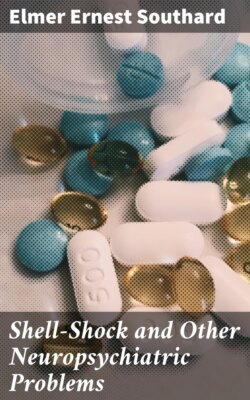Читать книгу Shell-Shock and Other Neuropsychiatric Problems - Elmer Ernest Southard - Страница 85
На сайте Литреса книга снята с продажи.
ОглавлениеNocturnal narcoleptic seizures accompanied by spells of somnolence in the day, both to be regarded as due to the “brain fag” of trench life.
Case 77. (Friedmann, July, 1915.)
A tradesman, 23, had been in the German infantry since the beginning of the war. Never sick, he had been, in a general way, nervous; and a brother had had, at the age of 30 years, some sort of severe brain disease, in which he became blind, dying a year later.
The man was for a long time in the trenches and proved himself a courageous and stalwart soldier. He went to hospital after a slight bullet wound of the leg, with a benign paralysis of the peroneus.
In the hospital he began to show a somewhat pronounced emotional depression, with a nervous tachycardia.
Friedmann reports the case on account of certain peculiar seizures which, upon the man’s own story, had begun five weeks before, in the field, although he had told no one about them. He had never felt anything like them before. At first, they came three to five times almost every night. He would suddenly wake and find himself unable to move, to speak, or even to think. These seizures, however, were not accompanied by any feeling of anxiety or any respiratory distress. Consciousness remained clear, and after 10 or 15 seconds, he could begin to think normally again. It was clearly a question of psychopathic absences of a mild narcoleptic type, occurring, however, only at night.
Daytimes, also, throughout the whole period in which the nocturnal absences occurred, there were seizures of another description. During the many hours in which he had to sit in the trench, about twice a day for half an hour long, he would plunge suddenly into a sort of irresistible lethargy. Without any external occasion whatever, there would be a feeling of great fatigue. In the spell he could not move or think, would lean his head upon his hand. He was unable to overcome the feeling of weariness and became convinced that he was ill, and that the fatigue could not be natural. However, he did his work like the rest. Friedmann interprets these spells as a kind of imperfect sleep.
The patient was physically healthy and stalwart, mentally not excitable, and tolerably tranquil in the midst of shell fire. He would never have been reported sick had it not been for his wound. Aside from the tachycardia, of which he himself complained little, nothing wrong was found in the hospital. There was, to be sure, a feeling of discomfort without any hysterical tinge, and sleep was restless. Aside from the peroneus palsy, the injury made a good recovery. The nocturnal attacks persisted; bromides and even luminal failed of effect. There was, however, no longer any somnolence by day. In fact, for the five weeks of observation, there was no change in his condition.
Friedmann states that mild emotional alterations are not infrequent in the trenches with minds disposed thereto, although emotional shock, especially in shell fire, is the most frequent cause. However, these particular seizures are quite unusual. The stresses of field service lead to a sometimes complete paralysis of mental power, interfering transiently with service. There is no evidence of sudden circulatory disturbances such as would bring about dizziness, pallor, nausea, or fainting spells. According to Friedmann, the regulative brain functions, especially those that maintain consciousness, become weak on account of a condition which he terms Gehirnmüdigkeit, or, as we should say in English, brain fag. The situation forbids due completion of sleep. Thus, the explanation of the daytime attacks follows rather obvious lines of brain fag. The accidental awakening it is, which at night produces the absences; the wakenings are due to the general restlessness of the patient. The general weakening of cerebral function produces the disorder at the moment of wakening, since the regulative factors of consciousness are already out of order. The condition in the absence rather closely resembles the state of consciousness just before going to sleep, and also perhaps the state of consciousness during the process of awakening. It is as if the process of waking were somehow delayed a few moments. Friedmann is interested to show the relation of such absences to the so-called gehäuften kleinen Anfälle, originally described by him in 1906 as occurring in children, and distinguished from epileptic attacks. These attacks, after lasting for years, finally disappeared completely. The same sort of thing in adults was symptomatic of some other disease, such as neurasthenia, and was not a true entity. In children these attacks failed to be attended with any mental injury, nor were there any pronounced epileptic phenomena. Bromides had no effect upon them, and they already showed a somewhat striking and peculiar appearance, involving interruptions ten seconds long of capacity to think, speak, or move, without disturbance of consciousness or automatic movements. Sometimes the attacks occurred from six to 100 times in the day, without in any respect interfering with the general condition of the child. The occurrence of such series of mild seizures is nothing but a syndrome. To be sure, some cases turn out to be cases of genuine epilepsy with an eventual degenerative process. Some forms belong in the spasmophilia group, and some among the hysterias. However, according to Friedmann, there is a narcoleptic petit mal that is an entity by itself, proceeding after a period of years to complete recovery without complications. It is this form which may be regarded as a peculiar kind of brain fag. The case of the soldier may be supposed to be one which will prove to have this benign outcome.
